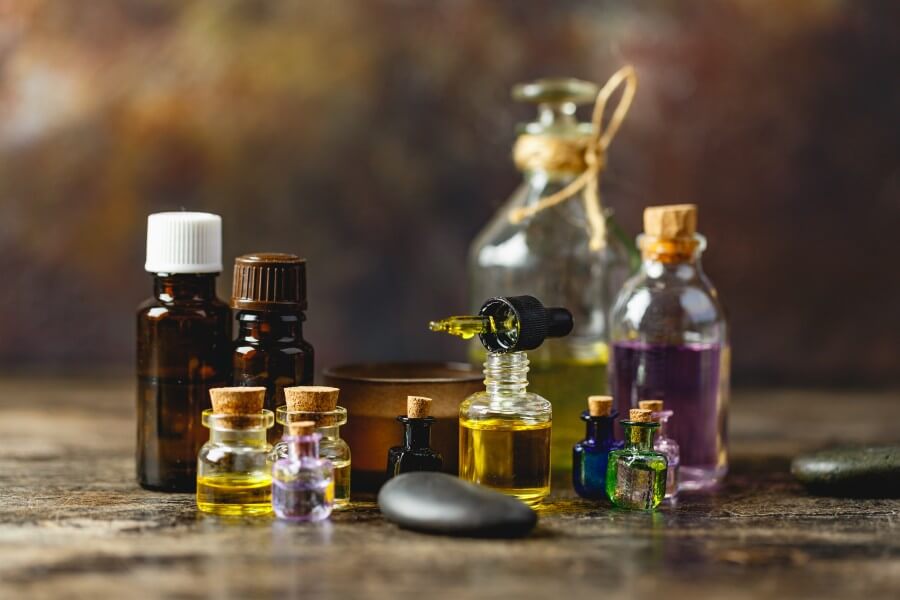Ingredients, Reviva Labs, Skin Care
How Essential Oils Affect Your Skin: Pros and Cons
Essential oils have become increasingly popular in skincare routines. Their natural origins and various benefits make them appealing to many. But how exactly do they affect your skin? It’s essential to understand both the advantages and potential drawbacks of using these concentrated plant extracts.
Benefits of Essential Oils for Skin
Essential oils are known for their potent properties, offering a range of benefits for the skin. One of the most significant advantages is their anti-inflammatory effects. Oils like tea tree and lavender have been widely recognized for their ability to reduce inflammation and soothe irritated skin. This makes them particularly useful for individuals with conditions such as acne, eczema, and psoriasis.
Another benefit is their antibacterial properties. Essential oils like eucalyptus and tea tree are excellent at combating bacteria that can cause acne and other skin infections. This natural antibacterial action can help keep your skin clearer and healthier without the need for harsh chemicals.
Essential oils also offer antioxidant benefits. Oils like rosemary and frankincense contain high levels of antioxidants, which help to protect the skin from free radicals and environmental damage. This can slow down the aging process, reduce the appearance of wrinkles, and improve overall skin health.
Hydration is another key benefit. Essential oils like rose and jojoba are known for their moisturizing properties. They can penetrate the skin deeply, providing hydration and helping to maintain a healthy moisture balance. This is particularly beneficial for those with dry or mature skin.
Essential oils can also improve skin tone and texture. Regular use of oils like geranium and carrot seed oil can help to even out skin tone and promote a smoother, more radiant complexion. This makes them a valuable addition to any skincare routine aimed at enhancing the skin’s appearance.
Risks and Potential Drawbacks
Despite their many benefits, essential oils also come with potential risks and drawbacks. One of the primary concerns is skin sensitivity. Some essential oils can cause allergic reactions or irritation, especially in individuals with sensitive skin. Oils such as lemongrass and cinnamon are known to be more irritating and should be used with caution.
Overuse of essential oils can lead to adverse effects. Because they are highly concentrated, using too much can overwhelm the skin and cause issues such as redness, burning, or peeling. It’s crucial to dilute essential oils properly before applying them to the skin to avoid these negative outcomes.
Another risk is photosensitivity. Some essential oils, particularly citrus oils like lemon and bergamot, can increase the skin’s sensitivity to sunlight. This can lead to severe sunburns and long-term damage if proper precautions are not taken. It’s important to avoid sun exposure after applying these oils or to use them in the evening.
According to the American Academy of Dermatology, about 50 million Americans are affected by acne annually, making it one of the most common skin conditions. This highlights the potential role of essential oils in providing natural and effective solutions for skin care.
Interactions with other skincare products can also be a concern. Essential oils may react with ingredients in other products, potentially causing irritation or reducing their effectiveness. It’s advisable to introduce essential oils slowly into your routine and monitor how your skin responds.
The quality and purity of essential oils can vary widely. Low-quality or adulterated oils can cause more harm than good. It’s essential to purchase oils from reputable sources and ensure they are 100% pure and free from additives or contaminants.
How to Use Essential Oils Safely
To reap the benefits of essential oils while minimizing risks, it’s important to use them safely. Always perform a patch test before using a new essential oil. Apply a small amount of the diluted oil to a patch of skin and wait 24 hours to see if any reaction occurs. This can help you identify any potential allergies or sensitivities.
Dilution is key when using essential oils on the skin. A common recommendation is to mix a few drops of essential oil with a carrier oil such as jojoba, coconut, or almond oil. This not only reduces the risk of irritation but also helps the essential oil to spread more easily across the skin.
Start with small amounts and gradually increase as needed. It’s better to use less and observe how your skin reacts than to apply too much and risk adverse effects. Remember that essential oils are potent, and a little goes a long way.
Be mindful of the specific needs of your skin type. For instance, if you have oily skin, choose essential oils known for their balancing properties, such as tea tree or rosemary. For dry skin, opt for oils with hydrating benefits, like rose or lavender. Tailoring your use of essential oils to your skin type can enhance their effectiveness.
Popular Essential Oils and Their Uses
Different essential oils offer unique benefits and are suited for various skin concerns. Here’s a look at some popular ones and their specific uses.
Tea Tree Oil: Known for its powerful antibacterial and anti-inflammatory properties, tea tree oil is widely used to treat acne. It can help reduce breakouts and prevent future ones by keeping the skin clear of bacteria.
Lavender Oil: With its soothing and calming effects, lavender oil is beneficial for irritated or sensitive skin. It can help reduce redness, soothe sunburns, and even out skin tone.
Rosehip Oil: Rich in vitamins A and C, rosehip oil is excellent for reducing the appearance of scars and hyperpigmentation. It also provides deep hydration and helps to improve skin texture.
Chamomile Oil: Chamomile oil is highly effective in calming irritated skin and reducing inflammation. It’s ideal for those with eczema or other inflammatory skin conditions.
Frankincense Oil: This oil is known for its anti-aging properties. It can help reduce the appearance of fine lines and wrinkles, promote cell regeneration, and improve overall skin elasticity.
Geranium Oil: Geranium oil is great for balancing the skin’s natural oil production, making it useful for both oily and dry skin types. It also helps to tone and tighten the skin, giving it a more youthful appearance.
Essential Oils for Specific Skin Conditions
Essential oils can be particularly effective for certain skin conditions when used correctly. For instance, acne-prone skin can benefit greatly from the antibacterial properties of tea tree and lavender oils. These oils help to clear out the pores and reduce inflammation, leading to fewer breakouts.
For dry skin, oils like rose and chamomile provide deep hydration and help to restore the skin’s natural barrier. These oils can penetrate deeply into the skin, providing long-lasting moisture and reducing the appearance of dry patches and flakiness.
Aging skin can benefit from the anti-aging properties of oils like frankincense and rosehip. These oils contain high levels of antioxidants and vitamins that promote cell regeneration, reduce the appearance of wrinkles, and improve skin elasticity. Regular use can lead to a more youthful and radiant complexion.
Sensitive skin requires gentle care, and essential oils like chamomile and lavender are perfect for this purpose. Their soothing properties help to calm irritation, reduce redness, and protect the skin from further damage. Always ensure that these oils are properly diluted to avoid any potential irritation.
The Importance of Quality and Sourcing
The effectiveness and safety of essential oils largely depend on their quality and sourcing. Pure, high-quality essential oils are more potent and provide better results. On the other hand, low-quality oils may be diluted with fillers or contaminated with harmful substances, posing a risk to your skin.
When purchasing essential oils, look for products that are labeled as 100% pure and therapeutic grade. These labels indicate that the oils have been tested for purity and potency and are free from additives. It’s also helpful to check if the oils have been certified by a reputable organization.
Source matters too. Essential oils derived from organically grown plants are generally of higher quality because they are free from pesticides and other harmful chemicals. Additionally, the extraction method can affect the oil’s quality. Cold-pressed or steam-distilled oils are typically more potent and effective than those extracted using chemical solvents.
Final Thoughts on Essential Oils and Skin Care
Essential oils can be a valuable addition to your skincare routine, offering a range of benefits from anti-inflammatory and antibacterial effects to deep hydration and anti-aging properties. However, it’s important to use them correctly and be aware of potential risks such as skin sensitivity, photosensitivity, and interactions with other products.
To maximize the benefits and minimize the risks, always perform a patch test, dilute the oils properly, and choose high-quality products from reputable sources. Tailoring your use of essential oils to your specific skin type and concerns can help you achieve the best results and maintain healthy, glowing skin.
Remember, while essential oils can offer significant benefits, they are not a one-size-fits-all solution. It’s essential to listen to your skin and adjust your routine as needed. With careful use and attention to quality, essential oils can be a powerful tool in your skincare arsenal.






